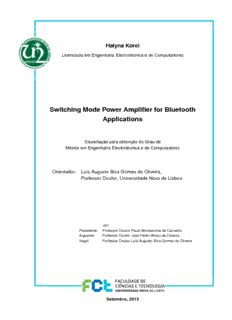
Switching Mode Power Amplifier for Bluetooth Applications PDF
Preview Switching Mode Power Amplifier for Bluetooth Applications
Halyna Korol Licenciada em Engenharia Electrotécnica e de Computadores Switching Mode Power Amplifier for Bluetooth Applications Dissertação para obtenção do Grau de Mestre em Engenharia Electrotécnica e de Computadores Orientador: Luís Augusto Bica Gomes de Oliveira, Professor Doutor, Universidade Nova de Lisboa Júri: Presidente: ProfessorDoutorPauloMontezumadeCarvalho Arguente: ProfessorDoutorJoãoPedroAbreudeOliveira Vogal: ProfessorDoutorLuísAugustoBicaGomesdeOliveira Setembro, 2015 Switching Mode Power Amplifier for Bluetooth Applications Copyright c Halyna Korol, Faculdade de Ciências e Tecnologia, Universidade (cid:13) NovadeLisboa A Faculdade de Ciências e Tecnologia e a Universidade Nova de Lisboa têm o direito,perpétuoesemlimitesgeográficos,dearquivarepublicarestadissertação atravésdeexemplaresimpressosreproduzidosempapeloudeformadigital,ou porqualqueroutromeioconhecidoouquevenhaaserinventado,ede adivulgar através de repositórios científicos e de admitir a sua cópia e distribuição com objectivoseducacionais oude investigação,não comerciais,desde queseja dado créditoaoautoreeditor. "Everysolutionbreedsnewproblems"-ArthurBloch (Murphy’slaw) A CKNOWLEDGEMENTS Chegandoaestafase,édereflectirnasinúmerasoportunidadeseconcretizações, tanto a nível pessoal como a nível profissional, que aconteceram graças à FCT- UNL. Esta, não só é uma instituição com espaço de admirar, mas que também oferecedistintasáreasdeaprendizagemcomprofessoresnotáveisnasrespectivas áreas.Aistodevoummuitoobrigado! Em segundo lugar, gostaria de agradecer a todos os professores do departa- mentodeelectrónica.MasdevoumespecialagradecimentoàprofessoraHelena Fino,porque foiela quedesde princípiocriou aminha paixãopela electrónica;ao professor João Goes por ter feito crescer a minha paixão ainda mais, mas desta vezpelamicro-electrónica;aoprofessorLuísOliveira,quetantocomoprofessor como meu orientador sempre me guiou e sempre me motivou; aos professores JoãoOliveira,NunoPaulinoeRuiTavaresporseremesplêndidosprofessores.Um especial obrigado também ao professor Luís Bernardo, André Mora e Anabela Pronto,porseremmaisdoqueprofessores. Quero tambémexpressar aminha gratidãopara comos meuscolegas dasala 3.5,quesemacompanhiadelesotrabalhonuncaseriaomesmo,nemosalmoços, nemospequenosintervalosnumespaçoquemuitobempodiaserchamadode“a nossacasa”.Porisso,aeles,semexclusãoalguma,mesmoosquejá“partiram”, outromuitoobrigado. Um obrigado também às pessoas que mais me marcaram neste percurso académico: Jorge Silva, Denise Solange, Dilcarina Duarte, Tiago Bento, Celso AlmeidaeaAnaCarreira,aminhacompanheiradecomboio. E por último deixo o meu maior agradecimento às pessoas mais especiais na minha vida: à minha melhor amiga Carla Borges, que nos piores momentos sempreesteveláparameapoiar;aomeunamoradoRicardoNeves(FCT:)),que tornou este percurso inesquecível, mais especial ainda, deu-me forças e sempre acreditouemmimquandonemeujáacreditava.Esemdeixardeparteapessoa maisimportantedaminhavida,porquesemelanadadistoerapossível:Obrigado Mãe! vii A BSTRACT Modern fully integrated transceivers architectures, require circuits with low area,lowcost, lowpower,andhigh efficiency.Akey blockinmodern transceivers isthepoweramplifier,whichisdeeplystudiedinthisthesis. First,westudy theimplementationofaclassical Class-Aamplifier, describing thebasicoperationofanRFpoweramplifier,andanalysingtheinfluenceofthe realmodelsofthereactivecomponentsinitsoperation. Secondly, the Class-E amplifier is deeply studied. The different types of im- plementationsarereviewedandtheoreticalequationsarederivedandcompared with simulations. There were selected four modes of operation for the Class-E amplifier,inordertoperformtheimplementationoftheoutputstage,andthesub- sequentcomparison ofresults. Thisled totheselection ofthe modewith thebest trade-offbetweenefficiencyandharmonicsdistortion,lowerpowerconsumption andhigheroutputpower.Theoptimalchoicewasaparallelcircuitcontainingan inductorwithafinitevalue.TocompletetheimplementationofthePAinswitch- ingmode,adriverwasimplemented.Thefinalblock(outputstagetogetherwith thedriver)got20%totalefficiency(PAE)transmitting8dBmoutputpowertoa Ω 50 loadwithatotalharmonicdistortion(THD)of3%andatotalconsumption of28mW. All implementations are designed using standard 130 nm CMOS technology. The operating frequency is 2.4 GHz and it was considered an 1.2 V DC power supply. The proposed circuit is intended to be used in a Bluetooth transmitter, however,ithasawiderrangeofapplications. Keywords: Poweramplifier,Bluetooth,CMOS,efficiency,distortion,switching mode,driver,Class-A,Class-E. ix
Description: